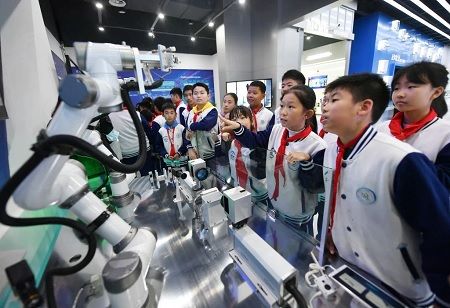- From Sept 1, 2025, all students aged 6-18 must complete at least 8 hours of AI lessons annually.
- Kids learn through robots and apps in early years, while high schoolers tackle machine learning and ethics.
- Policy aligns with China’s 2030 AI leadership goal but faces teacher training and rural access challenges.
Starting September 1, 2025, China will require all students from elementary through high school to study artificial intelligence (AI) for at least eight hours each year. Beginning at age six, children will be introduced to AI as part of their compulsory education. The policy, announced by the Beijing Municipal Education Commission and supported by national guidelines, is being described as the most comprehensive effort in the world to integrate AI into school curricula.
The program is designed in stages to match student development. Elementary students between the ages of 6 and 12 will engage in fun, hands-on activities like programming small robots and using simple AI tools to understand the basics. Middle school students will focus on how AI is applied in daily life, exploring examples such as smart home devices or personalized learning apps. By high school, students will begin to learn about machine learning concepts, take part in innovation projects, and discuss important ethical issues like algorithmic bias and surveillance.
Schools may choose to teach AI as a separate subject or combine it with existing science and IT courses, with a focus on a 'teacher-student-machine' model that encourages collaboration and includes discussions on ethics.
This major education reform is part of China’s larger strategy to become a world leader in AI by 2030, a goal first set in the 2017 'Next Generation Artificial Intelligence Development Plan'. AI is expected to add around $600 billion to the Chinese economy every year by the end of the decade, and officials see preparing the next generation as essential to reaching that goal.
Education Minister Huai Jinpeng has called AI 'the golden key to China’s future', stressing its importance in shaping the country’s workforce. The rollout builds on pilot programs already tested in 184 schools and is aligned with the government’s 'Education Modernization 2035' blueprint.
Also Read: China to Introduce Mandatory AI Education in Schools by 2025
However, the plan also faces challenges. Teacher training is still limited, with only 58 percent of educators having received AI upskilling so far. Many rural schools, particularly in regions such as Tibet, still lack the necessary digital tools, which risks widening the education gap between urban and rural areas. Overcrowded classrooms, often with more than 45 students, could make hands-on learning difficult. Experts say the success of the program will depend on how these issues are addressed.
Even with these challenges, China’s decision reflects its determination to build AI literacy on a massive scale. By making AI part of everyday learning from primary school onward, the country is positioning its students to grow up with algorithms as familiar as algebra, potentially reshaping both its innovation pipeline and the global AI race.

